- Home
- David Dalglish
The King of the Fallen Page 2
The King of the Fallen Read online
Page 2
“Must you ask this of me?” he begged the cold night air. “Must you ask this of us? We held no need of your magic, if only we believed your kind gaze still fell upon us. Instead you give us this. Your faithful have fallen. Your angels cry out for slaughter.”
Bernard wept for Dezrel. He wept for her children. And yes, shameful as he felt to admit it, he wept for himself.
When his tears were fully shed, he returned inside. He packed what belongings he could carry into a rucksack and bid goodbye to the rest of the priests. When pressed for an explanation, he told them only of what he had seen, and of the curse that had befallen Ashhur’s chosen. As for his own path, he remained silent. To even speak it risked breaking the trance that had overcome him. By the time the sun rose, he was already on the road east, the Sanctuary a fading mirage of stone towers carved into the base of the Elethan mountains.
Bernard settled for the night alongside the northern edge of the Corinth River, which he’d been following eastward for the past few days. Nothing outwardly told him to stop there, but he could not have continued even if he wanted. A presence lingered in that empty stretch of grass, heavier than any stone. He set his pack down, and after only a quick search, found the remnants of a campfire.
“You were here, weren’t you?” he whispered.
Creating a fire with a snap of one’s fingers was a wizard’s trick. Thankfully Bernard had a small wooden tinderbox, and after a few minutes of scrounging up twigs and dry grass, he used the flint to light a new campfire. He tended it carefully, content to stare into the growing flames as the sun set and the night came.
“Who were you?” he asked the silence. “Was it a blessing Ashhur granted you, or a curse?”
He had expected no answer from the night, but it gave him one nonetheless. The stars shifted in the sky above. A man emerged from the mud and filth of the nearby river. His clothes shimmered with a ghostly light. Bernard stared at the phantom, overwhelmed with pity and shame. This man, he appeared so plain, his hands calloused, his skin tanned from long hours in the sun. His dark hair was long, disheveled, and matted to his face from a frantic swim across the Corinth.
“If I must,” this unknown ghost of a man said as he staggered over the riverbank. “Ashhur help me, if I must.”
“Must you?” Bernard asked the ancient memory walking across grass that did not bend at its touch. “Forgive me, stranger. Forgive me, if you are still alive to offer that forgiveness.”
These dreams he endured were not the first to haunt his nights with prophetic power. Months prior, the nightmares had begun. He had walked through streets of crystal and gold, surrounded on all sides by a teeming mass of people. It was the earthbound city of the angels, Devlimar, that he knew from his previous visit. This dreamlike version had been different, though. The way the light sparkled off the crystal felt drained, hollow. The gold shone with no luster. The people around him weren’t joyous or uplifted, but terrified.
In that dream, Bernard had pushed through to the front of a crowd. A great throne awaited him, resting atop a dais wrapped in red silk. From the sky descended a shadowed man, his eyes white portals, his shoulders hunched, his wings ragged and black. He sat upon the throne, and as his body hunched upon it with a heavy burden, a silver crown had formed about his head. Upon witnessing that crown, Bernard had cried out, and the nightmare trembled, so close to breaking yet refusing to release him. Not yet. The image was not yet finished.
The red dais melted like ice beneath a summer sun. The silk turned to blood. The golden throne became one of bone. This shadowed man lifted a jagged scepter. The ground rumbled and the crystal buildings collapsed into shards. As the sun and moon danced backwards in the sky, Bernard had stepped before this wretched king and lifted his arms to the heavens. He had drawn in a breath, and from his chest boomed out a single word of condemnation.
He never remembered the word. He never remembered the destruction that followed. Bernard had always awakened, soaked with sweat and sobbing uncontrollably. For weeks, he had endured that nightmare. For weeks, he had told himself he was merely getting old and struggling with memories of war. Gods had sundered his homeland, and he had lost so many beloved friends and family, why wouldn’t he still bear the mental scars? Dreams, he insisted. No one else at the Sanctuary endured anything similar. Meaningless dreams.
Except...
Bernard watched this phantom stranger lurch north. There was no question his direction. Devlimar. The city of the angels.
One night a few weeks past, Bernard had awoken from the dream and staggered to the side of his bed. He’d clutched his hands together in prayer and given in to his shame. He pleaded for Ashhur to spare him. He begged for an end to the dreams, and that the cup be passed to another. He had fought his war. He had endured the wrath of Karak’s followers. Let him die peacefully within the Sanctuary. Let the struggles of the road, and the condemnation of prophets, be given to another man. Never before had he felt so weak, so ashamed of himself, but the task felt too grand for his weary shoulders to bear.
And so Ashhur had done exactly that.
“I’m sorry,” Bernard said, and he fell to his knees and bowed his head as the stranger faded into the night. “I’m so sorry. The path you walked was mine. Forgive my cowardice. Forgive my fear.”
When the dreams had stopped, and quiet days resumed, Bernard had told himself those dreams had meant nothing. They were lingering guilt, delusions, or a future never meant to be. And then all of Ashhur’s faithful had heard those words, felt their every syllable deep in their bones. Then came the new dreams. Then came the fallen angels, the shadows of their black wings falling upon the Sanctuary.
“I don’t know who you were,” Bernard whispered to the dirt. “I don’t know why you were chosen above all others, but I do know why you were chosen over me. You were brave when I was not. You were willing to act when I sought to hide. You cried out against the rot while I closed my eyes and prayed it was only an illusion. For what strength I have left, I promise to make amends. I feel the rage, blessed stranger. Soon Ashhur’s betrayers shall feel it, too.”
All too easy to make promises after the mistake was made and the damage done, but Bernard could not change the past. He could only determine his future.
The campfire before him dwindled, the stars shifted again, and he felt the heavy weight pass as the moment ended. The night was quiet, and without memory or magic. He removed his bedroll, laid it out beside the fire, and succumbed to a fitful sleep, one blessedly lacking in dreams.
When he awoke that next morning, Bernard scattered the ashes of the fire, drank the last of his water, and began his trek north. Into Paradise. Into the land of fallen angels.
1
Azariah slowly paced the circle of stones lying atop the bare floor. The angel had twisted this room at the very top of a tower for this very purpose. He’d had his undead rip up the carpet and haul out every piece of furniture to make space for rows and rows of bookshelves to line the walls. High above the wretched human city, Azariah would turn it into a place of wisdom and power. A place of magic.
“Thirteen stones,” he whispered, taking in each and every stone with satisfaction. Blue-silver runes were carved into their tops. “Thirteen stones, thirteen runes, thirteen words of power. You had many faults, Celestia, but the structure of your magic was inspired.”
The angel had to relearn much about the nature of arcane magic. Over the centuries, he’d grown to view it as confused and inelegant compared to divine magic, the flowing nature of the prayers required to draw power from Karak and Ashhur. The verbal components twisted the tongue, forcing spidery phrases and guttural barks tangled amidst one another. Now, was he starting to appreciate their construction again, as he had the first time the gods had clashed.
Pulling in power from Celestia’s Weave was a complicated and dangerous prospect. Everything required an exact understanding, and the long phrases and syllables were all meant to convey an extreme am
ount of knowledge and control in a very short time. Simplicity, Azariah remembered, did not always mean best.
A knock at the door broke his concentration. Azariah didn’t need to ask who was there. He’d carved a simple scrying spell into the deep wood, allowing him immediate knowledge. With each passing moment his connection to the Weave grew, filling in the absence of divine power Ashhur had once granted him.
Thinking of his once-beloved deity set a frown to the fallen angel’s face. He pushed the thought aside and opened the door to greet Judarius, his newly appointed Executor.
“I pray this matter is urgent,” Judarius said. He stood at the top of the spiraling stairs that wound their way around the outside of the tower before halting at the chamber door. His gray wings were folded behind him, his face covered but for two eye slits in an obsidian mask that matched the black hue of his platemail. He’d commissioned it from one of Mordeina’s smiths shortly after they’d been cursed. The sight of gold seemed too painful a reminder of what they’d once been, before Ashhur’s great betrayal. Azariah knew part of it was also to hide Judarius’s newly changed face. The wounds were too fresh. Hopefully in time, the rest of his brethren would learn to accept their new physical nature.
“I need you to wait here for my return,” Azariah explained as he stepped away from the door. “If I do not, you must assume command of the city before any confusion or chaos may result.”
Judarius ducked low, his wings folding even tighter to fit through the doorway. The room was more than large enough, given humanity’s tendency to exhibit wealth by sheer size of occupied space, but doorways were still designed for mortals instead of their heavenly kind.
“I don’t need to be told how to keep order,” Judarius said. He frowned at the circle of stones. “And what spell are you attempting that puts your life in such danger?”
Azariah suppressed a smile. Though the interior of his lips had hardened and calloused significantly, the spreading of his flesh across his sharp teeth still risked drawing blood.
“It is not the spell that puts me in danger, but where I go. My intent is not to stay long, but complications may arise, especially if the veil is still weak and torn.”
“Veil?” asked Judarius. “Speak plainly. Where are you going?”
Azariah turned to the thirteen stones, each one a little beacon in his mind.
“To where it all began.”
He raised his arms, extended his palms to the ceiling, and began whispering the words. They were simple and short but needed to be repeated multiple times to build up the energy required to create a portal. He could summon a weaker one without need of runes and extensive preparation, but that would only take him so many miles. To open a portal all the way to the other side of the continent was a far greater feat.
Upon the thirteenth repetition, he shouted the final syllable while thrusting his arms downward. The glowing light of the runes leapt from the stones and into a tiny blue tear in space hovering in their center. It grew larger, larger, and then ripped open entirely to create a passageway to Veldaren’s long-abandoned throne room.
Excitement swelled in the pit of Azariah’s stomach. He’d debated traveling there many times since Thulos’s death, but he’d never wished to be absent from Mordan for so long, not during those formative years, and certainly not now with Ahaesarus and the Godslayer attempting to destroy all he’d accomplished and bring the world back into chaos. But as his magic grew, so too did his bravery.
My mind has been locked to my wings and the divine magics for too many centuries, he thought, stepping into the portal. I must begin embracing the new. And the old.
The sensation that struck his mind was of striding through a door. On one side was the cold dark stone of his tower; on the other was the grand hall that had been the throne room of dozens of kings since the first day of humanity’s creation. Azariah’s mind recoiled against the sudden change, along with the heavy, distorted sensation of traversing great distances in a blink. Effects of traveling via portal, the fallen angel knew. He closed his eyes and endured until they passed.
The vertigo ceased. He stood to his full height, stretched his wings, and looked about the ruins. The curtains and carpet were burned to ash. The doors leading to side halls were broken on their hinges. What had been fine portraits of former kings were now twisted bare frames hanging from exposed nails. The throne itself was missing, and Azariah wondered what the occupying orcs had done with it. Only one part matched the pristine glory Azariah remembered, and that was the great painting on the wall behind the throne.
No fire, blade, or magic had succeeded in tarnishing its color. It portrayed the brother gods, Karak and Ashhur, stepping from a grand portal into a land of plenty, marked by green fields and tall mountains shining gold in the sun. The goddess greeted them in her human form of pale skin, solid black eyes, and dark hair wrapping about her waist on its way to her ankles. Her pointed star, representing her divine form, pierced the blue sky above like a second sun. Azariah approached the painting, his footfalls echoing like thunder in the silent hall.
“We followed you,” Azariah whispered to the brother gods. Memories of a time before humans, before Dezrel, flitted like fireflies inside his mind. “When the war god destroyed our homes, you offered us escape. We came with you to Dezrel. We came with a promise of a better world. When you gave life to humanity under Celestia’s gaze, and named us their Wardens, we were honored. Let these frail little children know nothing of disease and death, you each decreed. Let them learn from the words of the divine. You would walk among them, let them hear your words, and teach them a way that meant hard work. They harvesting fields cyclical in their life and death, living in little villages knowing only friendship and peace.”
Azariah put his hand against Ashhur’s painted hand, the colorless gray of his skin a stark contrast to the vibrant bronze of the deity’s. Tears flowed from his eyes, and they itched upon his skin until he wiped them away.
“We raised them to have no need of sin,” he said. “We did all we could, and yet humanity would never have it. Their failures spread. Their imperfection took hold. Each of you succumbed to it, I understand now. It was never Ashhur the glorious good and Karak the sinful evil. You were two brothers who, in their desire to perfect their children, adopted their children’s imperfections without ever realizing it.”
He struck a fist against the painting.
“We were their Wardens, meant to protect humanity from all dangers, but how do you protect humanity from itself? How do you root out that deep need to destroy oneself? It’s in them all, each and every one. I feel it like a thousand thorns jabbing into my mind! This ravenous hunger for sin. This inability to accept peace, and love, to think of others beyond the importance of oneself. No wonder it broke you. No wonder you warred, confused and conflicted as to how your perfect creations broke so thoroughly within a perfectly crafted world.”
Azariah took in a shuddering breath. With each day in charge of the remnants of humanity he took on a greater understanding of that ancient war. As a Warden, it’d seemed so simple. He was the warrior for the side of righteousness. Karak was his foe, and therefore his servants were to be defeated. If only the world could remain so simple, but its children viewed things in such a naïve way, not the wise.
“Perhaps you hate us now,” he said to the portrait of Ashhur. “Perhaps you consider us a betrayal to your beliefs…but know we will ever strive for what you started, only we will do it with our eyes open to the faults and failures of humanity.”
Azariah turned his back to the three deities. The swirling blue portal he’d created remained hovering in the air, the image of Judarius on the other side worryingly thin and faded. Silently, he berated himself. He’d allowed his emotions to distract from his purpose. If the spell broke due to his incompetence, it’d be a very, very long flight back home to Devlimar.
A loud clang broke the silence, followed by shouts. Azariah listened for the source. Dow
n one of the side passages, it sounded like the slamming of another door. As for the voices themselves, they were deep and guttural, speaking a language of which he possessed only passing knowledge.
“Celestia’s cursed are playing house in Karak’s once grand castle,” the fallen angel said, and shook his head as he laughed. “It seems both brother gods suffer humiliation and defeat. Perhaps you escape the cursed visage we now bear, Karak, but you are humbled all the same.”
His chatter seemed to alert his sudden guests. Clanging steel rang out, along with a boisterous cry. Azariah crossed his arms, amused by the orcs’ lack of concern. And why should they show concern? Veldaren was theirs, and barring a few stubborn pockets of resistance, so was the entire eastern half of Dezrel.
“Welcome,” Azariah said as two half-naked orcs barged into the room. They looked decidedly drunk. One held an ax in both hands while the other wielded a sword in one and a giant tankard in the other. A foul brown substance sloshed across the floor when the orc pointed the tankard at him and shouted in the human tongue.
“What the shit’re you?”
Azariah spread his pale wings to their fullest extent, ran his fingers across the horns growing from his skull that created his ever-painful crown. He smiled, paying no heed to the little trickle of blood it sent down his teeth and across his tongue. The fear cutting through their drunken stupor was far too amusing.
“I am your guest,” he said. “Will you not offer me a drink?”
The two howled, either not understanding or not feeling particularly generous. They raised their weapons and charged. No caution. No guarded approach. Just a mad run to overwhelm him with strength and steel. It was almost worth another laugh.
Azariah pulled his wings tight against him and stayed grounded, deciding he should at least keep things fair. He outstretched his right hand, fingers curling into a specific shape to convey the rune needed to command the energy he pulled from Celestia’s Weave. Words passed over his tongue, feeling more and more natural with each attempt. Fire grew in his palm, a blazing seed held above his skin with little red streaks of electricity. With but a thought it flew toward the orcs, striking the stone just before their feet.

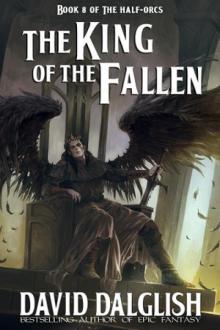 The King of the Fallen
The King of the Fallen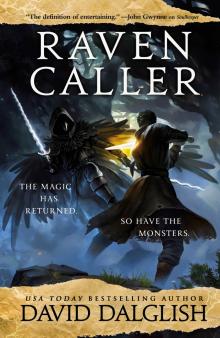 Ravencaller
Ravencaller Soulkeeper
Soulkeeper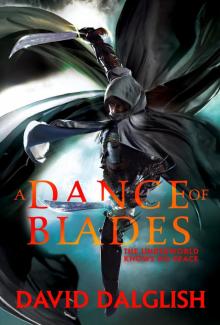 A Dance of Blades
A Dance of Blades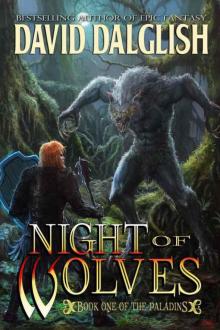 Night of Wolves p-1
Night of Wolves p-1 A Dance of Shadows
A Dance of Shadows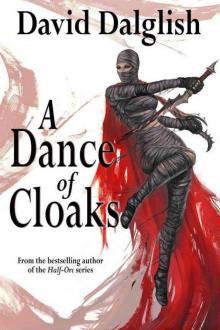 A Dance of Cloaks s-1
A Dance of Cloaks s-1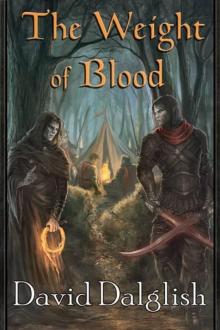 Weight of Blood
Weight of Blood A Dance of Chaos
A Dance of Chaos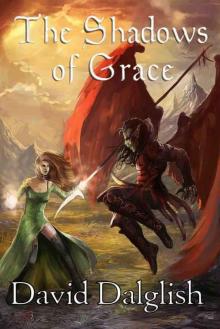 The Shadows of Grace h-4
The Shadows of Grace h-4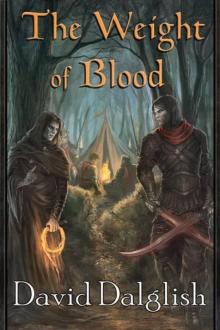 Weight of Blood h-1
Weight of Blood h-1 The Broken Pieces
The Broken Pieces The Shadowdance Trilogy
The Shadowdance Trilogy A Dance of Death (Shadowdance Trilogy, Book 3)
A Dance of Death (Shadowdance Trilogy, Book 3)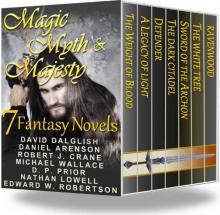 Magic, Myth & Majesty: 7 Fantasy Novels
Magic, Myth & Majesty: 7 Fantasy Novels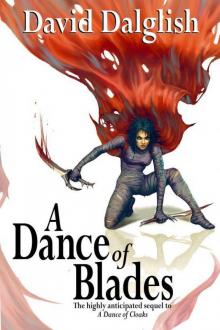 A Dance of Blades s-2
A Dance of Blades s-2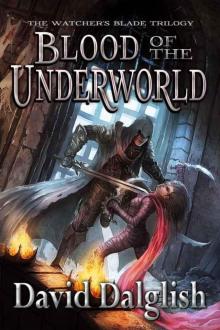 Blood of the Underworld
Blood of the Underworld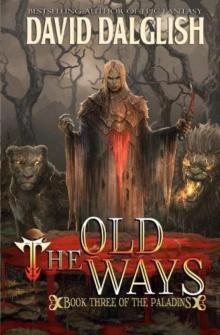 The Old Ways p-3
The Old Ways p-3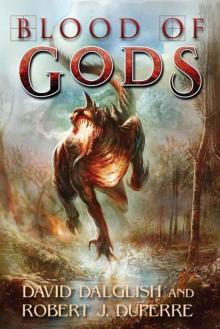 Blood Of Gods (Book 3)
Blood Of Gods (Book 3) Shadowborn
Shadowborn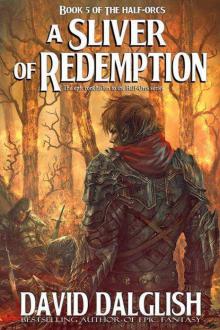 A Sliver of Redemption (Half-Orcs Book 5)
A Sliver of Redemption (Half-Orcs Book 5) Skyborn
Skyborn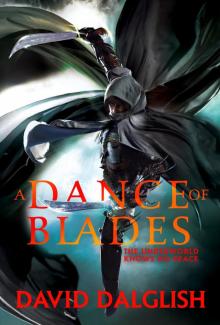 A Dance of Blades (Shadowdance 2)
A Dance of Blades (Shadowdance 2)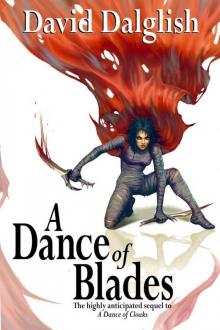 A Dance of Blades, (Shadowdance Trilogy, Book 2)
A Dance of Blades, (Shadowdance Trilogy, Book 2)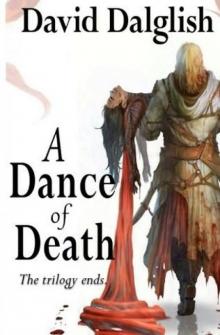 A Dance Of Death s-3
A Dance Of Death s-3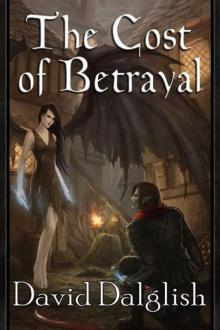 The Cost of Betrayal (Half-Orcs Book 2)
The Cost of Betrayal (Half-Orcs Book 2) Cloak and Spider: A Shadowdance Novella
Cloak and Spider: A Shadowdance Novella The Paladins
The Paladins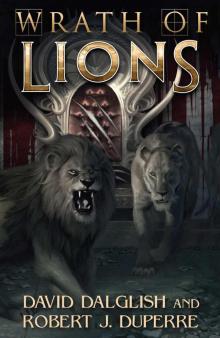 Wrath of Lions
Wrath of Lions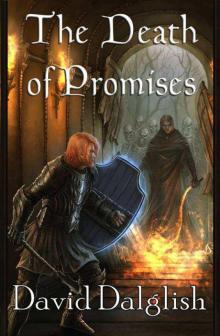 The Death of Promises (Half-Orcs Book 3)
The Death of Promises (Half-Orcs Book 3)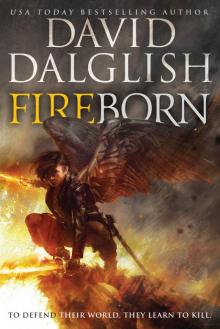 Fireborn
Fireborn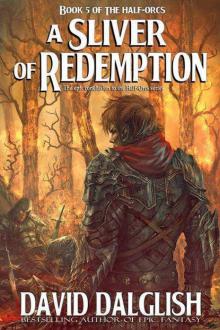 A Sliver of Redemption h-5
A Sliver of Redemption h-5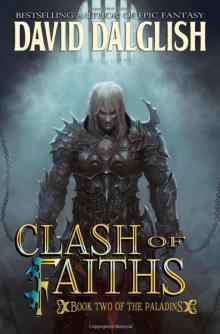 Paladins 02 - Clash of Faiths
Paladins 02 - Clash of Faiths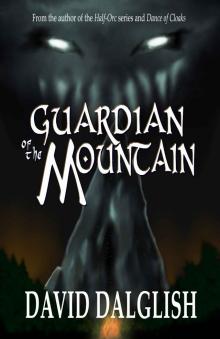 Guardian of the Mountain
Guardian of the Mountain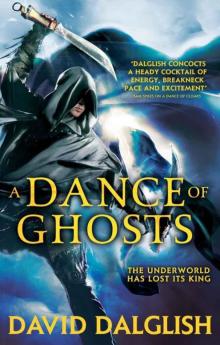 Shadowdance 05 - A Dance of Ghosts
Shadowdance 05 - A Dance of Ghosts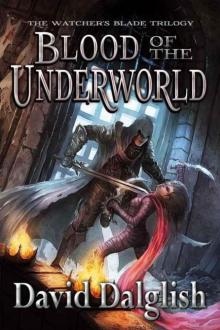 Blood of the Underworld twb-1
Blood of the Underworld twb-1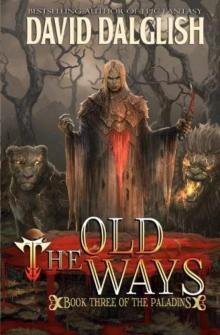 Paladins: Book 03 - The Old Ways
Paladins: Book 03 - The Old Ways Dawn of Swords
Dawn of Swords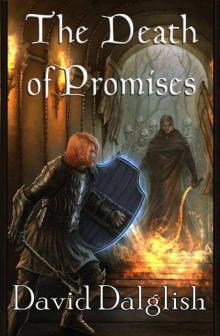 The Death of Promises h-3
The Death of Promises h-3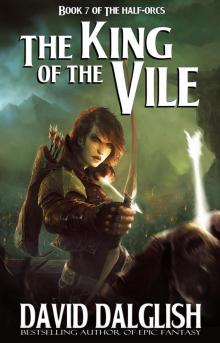 The King of the Vile
The King of the Vile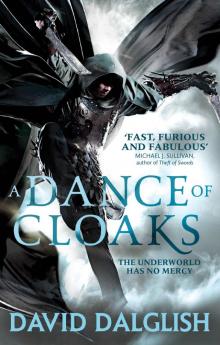 Shadowdance 01 - A Dance of Cloaks
Shadowdance 01 - A Dance of Cloaks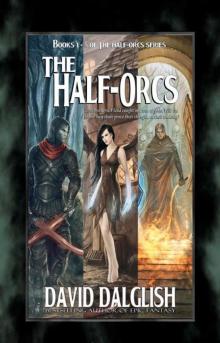 The Half-Orcs: Books 1-5
The Half-Orcs: Books 1-5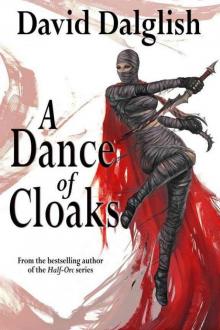 A Dance of Cloaks
A Dance of Cloaks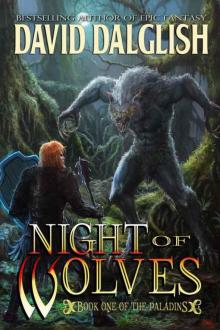 Paladins 01 - Night of Wolves
Paladins 01 - Night of Wolves A Dance of Chaos: Book 6 of Shadowdance
A Dance of Chaos: Book 6 of Shadowdance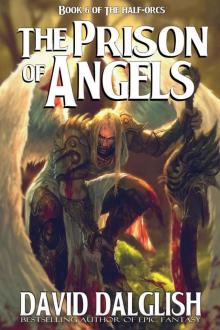 The Prison of Angels h-6
The Prison of Angels h-6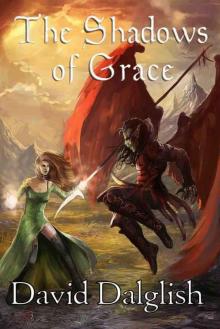 The Shadows of Grace (Half-Orcs Book 4)
The Shadows of Grace (Half-Orcs Book 4)